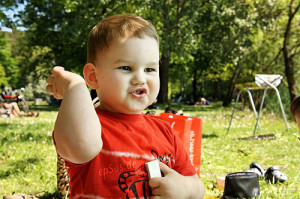
The Calm Jar: An Effective Mindfulness Tool To Help Children Manage Stress
Often children find it difficult to manage the flood of thoughts and emotions that they experience while coping with a difficult situation or even while

Often children find it difficult to manage the flood of thoughts and emotions that they experience while coping with a difficult situation or even while

Wouldn’t it be wonderful if our children could experience full joy while eating an ice-cream or while doing an activity they love, instead of burning

The arrival of your baby is no less than a joyous moment. The wait is finally over and you look forward to the next chapter

The parent of today is quite different from the parent of 20 years ago. If you are today’s parent, you read up regularly, follow various

What to Do If Your Child is Afraid of Monsters? “What if My 3 year old tells me he saw a ghost or monster? How

Do you see that your child is impatient, impulsive and is easily distracted? Or, that he is unable to continue one task until it is completed?
If you have noticed these tendencies in your child, perhaps they are due to his nature or personality. Or then, perhaps they are not. Maybe he simply can’t help being impatient. Maybe he can’t control his mind when it drifts off his books; and by the time he realizes, 10 minutes have passed.

Most of you may have come across a child who is naughty and stubborn, who tends to be insistent on getting his way, so much that people have to give in to what he wants much of the time. Some of you may even live with one such child in your family. This article is an attempt to unravel what such a child thinks, feels and needs. There is a further article here that elaborates on how parents and caregivers can better understand and deal with these children.
Stubborn children get noticed in most places – at home for sure, also at school, at play, even in public places and restaurants at times, much to their parents’ despair. It is easy to notice them; however, is it as easy to understand them?
Stubbornness and difficult behavior have their own way of functioning. They exist in the child for a reason. Until this reason is understood, children cannot be helped completely to change these behaviors. What’s more, if these reasons are not understood and appreciated, well meaning parents and teachers can do more harm than good to the child.
I invite you here to-
Take a Peek into the Stubborn Child

This is a question I am often asked by parents in therapy.
‘How to react if the child throws a temper tantrum?’
If you are a parent, you probably have been through this dilemma and resolved it. Or maybe you are going through it at present.
Some children find it easier to adjust when things don’t go their way. They may occasionally cry or fuss a little, but they’re largely open to adjusting.
Some children find it extremely difficult to make such an adjustment. They tend to get very upset when things don’t go their way. They may cry loudly, shout and insist that their demand be met with. The more you deny them what they want, the more they cry and the temper tantrum aggravates. Ultimately, you reach a place where you don’t know how to react.
In such a scenario, what is better? To fulfill the child’s demand or say no?

I often come across parents of nuclear families these days that are juggling between work, home, and baby- sitters. They constantly ponder about the fact

Most parents seek guidance on how they can change the negative behavior of their children and encourage more positive behavior. We have held two workshops at Inner Space focusing on behavior modification addressing these concerns. Behavior modification is the process applied to enable the child and parents to methodically bring about the required changes. It involves setting up rules of actions and consequent positive or negative repercussions. Positive behavior gets rewards while negative behavior gets no rewards.
This is also what we often do in life naturally. However, more often than not we do it inconsistently.

We specialize in combining psychotherapy with deep wellness practices like mindfulness and meditation and creating a customized mental health plan for individuals and organisations.
We specialize in combining psychotherapy with deep wellness practices like mindfulness and meditation and creating a customized mental health plan for individuals and organisations.

A young woman from another country moved with her family to live for one year in a town near the monastery. When, in the course of the year she discovered the monastery, she would periodically visit to have discussions with the Abbess. The Abbess introduced her to meditation, which became very meaningful for the young woman.
When the family’s year-long stay was drawing to an end, the young woman asked the Abbess, “In my country there is no Buddhism and no one has even heard about meditation. How can I continue to learn and deepen the practice you have started me on?”
The Abbess said, “When you return home ask far and wide for who, among the wise people, is recognized as having the greatest ability to listen. Ask that person to instruct you in the art of listening. What you learn about listening from such a person will teach you how to further your meditation practice.
― Gil Fronsdal, A Monastery Within: Tales from the Buddhist Path